
Exposé Online
What's old
Exposé print issues (1993-2011)
- 1 (October 1993)
- 2 (February 1994)
- 3 (May 1994)
- 4 (August 1994)
- 5 (October 1994)
- 6 (March 1995)
- 7 (July 1995)
- 8 (November 1995)
- 9 (March 1996)
- 10 (August 1996)
- 11 (February 1997)
- 12 (May 1997)
- 13 (October 1997)
- 14 (February 1998)
- 15 (July 1998)
- 16 (January 1999)
- 17 (April 1999)
- 18 (November 1999)
- 19 (May 2000)
- 20 (October 2000)
- 21 (March 2001)
- 22 (July 2001)
- 23 (December 2001)
- 24 (April 2002)
- 25 (September 2002)
- 26 (February 2003)
- 27 (August 2003)
- 28 (December 2003)
- 29 (April 2004)
- 30 (September 2004)
- 31 (March 2005)
- 32 (September 2005)
- 33 (May 2006)
- 34 (March 2007)
- 35 (January 2008)
- 36 (October 2008)
- 37 (July 2009)
- 38 (July 2010)
- 39 (Summer 2011)
Features
A Band, a Planet, a Vision —
A Short History of Gong

Gong was, and remains, one of the cornerstones of the genesis of progressive rock. Theirs is a legacy of utter originality, anarchic individuality, and atypically diverse and accomplished musicianship. Throughout the course of their extensive history, they have, in one form or another, recorded over twenty albums over the course of over twenty five years. While many fine musicians have entered and left the fold, the early focal point was clearly Daevid Allen, imported from Australia in search of the perfect vehicle to channel his Beat aspirations (he was an early associate of William Burroughs). After Allen left the band in 1974, French percussionist Pierre Moerlen assumed control of the band, as Allen and wife/collaborator Gilli Smyth went on to produce numerous projects and Gong reunions. For the purpose of brevity, this article will only cover material recorded under the Gong name. The offshoots are just too numerous to mention — certainly a testament to Gong's widespread influence across the European progressive rock scene.
by Steve Robey, Published 1996-08-01
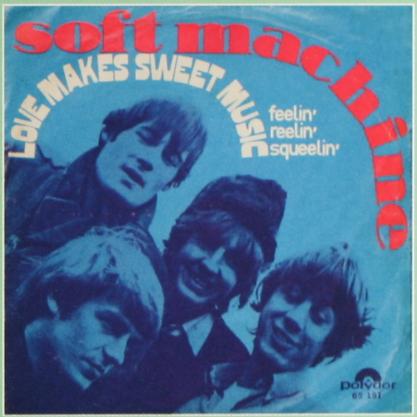 Life after the Soft Machine
Life after the Soft Machine
Our story begins in 1967. Daevid Allen, original guitarist for the celebrated Soft Machine, was just beginning to get a taste of fame and fortune. He appears on the Soft Machine's debut single, "Feelin' Reelin' Squealin'/Love Makes Sweet Music," a tasty bit of R&B that boded well for the band's future. However, upon the band's return to the UK following a European tour, he was denied entry as an "undesirable alien," and fled to Paris with his partner/wife/poetess Gilli Smyth. The Soft Machine, of course, went on to release numerous albums, many of them excellent. But that is another story...
In France, Allen and Smyth formed the first incarnation of Gong in 1967, a largely improvisational, loosely-knit combo that included, at various times, Don Cherry (trumpet), Loren Standlee (flute), and Daniel Laloux, who was wont to play (among other things) a bass drum with cello strings attached, while reciting the texts of Victor Hugo. Clearly, this band's music exemplified the free-form, stoned attitudes of the times. But already, the members' serious approach to musicianship set them apart from the pack. This version of Gong reached its apex in the spring of 1968, in the midst of "Les Evénements," the infamous riots that nearly toppled the French government. (A soundbite from a performance in the midst of these riots appears on the History and Mystery of the Planet Gong compilation). Fearing arrest (or worse), Allen and Smyth made a timely escape to Deya, Mayorca.
Enter the Bloom
It was around this time that Allen and Smyth met Didier Malherbe, who had played in and led a number of jazz outfits in France. Malherbe eventually inherited the nickname Bloomdido Bad de Grasse; the "Bloomdido" was named after a favorite Charlie Parker tune, and "Bad de Grasse" was a pun on the translation of his last name (Malherbe = Bad Grass). Bloomdido was to remain an integral part of Gong through most of their history, even after Allen's departure in 1974. His dexterously challenging sax lines and exotic flute stylings (at times incorporating such Eastern instruments as bamboo flute) became a part of Gong's trademark sound.
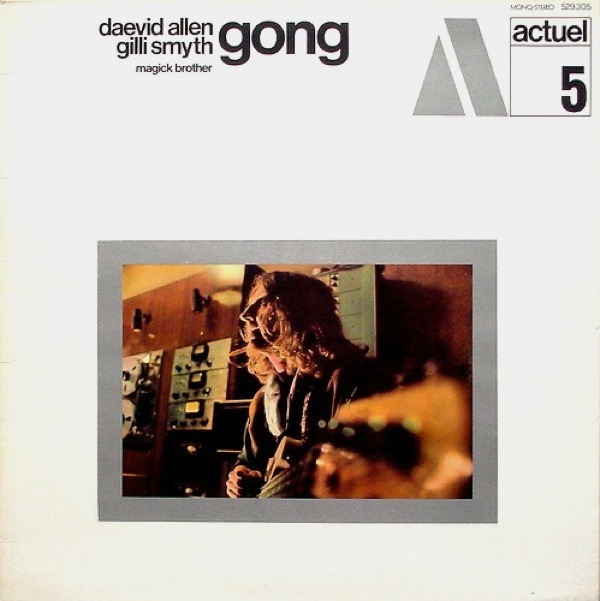 Meanwhile, Allen had secured a three-record solo contract with Byg Records. Although Gong as we know it had not actually formed yet, the first product of this arrangement, Magick Brother Mystic Sister (released in September of 1969), is commonly known as the first Gong album. Featuring Allen, Smyth, and Malherbe, along with Burton Green (a pianist from one of Malherbe's previous bands), Dieter Gewissler (bass), and Rachid Houari (drums), this first album was relatively low-fi and simplistic, but still had plenty to offer. Songs like "Glad to Say to Say" began a quirky song tradition that remained with them throughout their heyday. On the other hand, "'Cos You Got Green Hair" suggested another one of Allen's future directions: floating glissando guitar drones over a static or absent beat. The album rocks a bit too, as the "Gong Song" will attest.
Meanwhile, Allen had secured a three-record solo contract with Byg Records. Although Gong as we know it had not actually formed yet, the first product of this arrangement, Magick Brother Mystic Sister (released in September of 1969), is commonly known as the first Gong album. Featuring Allen, Smyth, and Malherbe, along with Burton Green (a pianist from one of Malherbe's previous bands), Dieter Gewissler (bass), and Rachid Houari (drums), this first album was relatively low-fi and simplistic, but still had plenty to offer. Songs like "Glad to Say to Say" began a quirky song tradition that remained with them throughout their heyday. On the other hand, "'Cos You Got Green Hair" suggested another one of Allen's future directions: floating glissando guitar drones over a static or absent beat. The album rocks a bit too, as the "Gong Song" will attest.
Soon thereafter, the "first" Gong performance was staged at the Amougies Festival in Belgium. The event was hosted by Frank Zappa, and featured up-and-coming acts such as Caravan, Soft Machine, Blossom Toes, and Captain Beefheart. The show was a great success; nevertheless, Gong continued to have difficulty getting good gigs. There was no real "club scene" in France at the time, and of the few gigs that were available, most were controlled by the Mafia. In a bold attempt to break free from the Mob's iron hand, Gong's two managers, Bob Benanoux (AKA Bob Banana) and Giorgio Gomelsky (later a famous producer in his own right), promoted their own set of shows, playing universities while staying free of the Mob's control. This alternative network became known to the band as "Floating Anarchy," an ideology that guided their sense of independence and non-conformity throughout the years.
Daevid's second solo album, Bananamoon, was released in 1971. It continued in the style of the previous album, but with a much tighter set of players (including Soft Machine's Robert Wyatt guesting on vocals, and new bassist/songwriter recruit Christian Tritsch, but with Malherbe noticeably absent) and a much more experimental bent. One of the more astounding tracks was "Stoned Innocent Frankenstein and his Adventures in the Land of Flip," which featured not only a killer riff, but also a twelve-minute tape loop extravaganza, inspired by the riots of 1968.
A Period of Transition
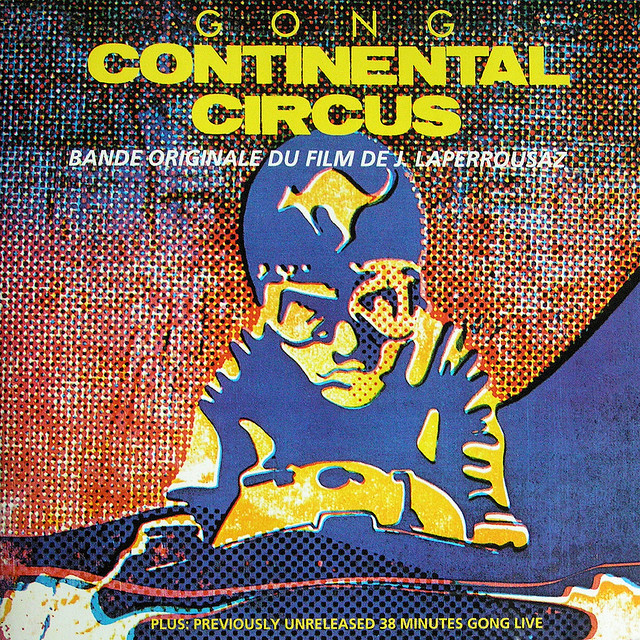 Gong expanded their reputation as spacious soundshapers with the two collaborative efforts they recorded in 1971, after Bananamoon. The first was Continental Circus, a soundtrack to a film by their friend Jerome Laperrousez (this soundtrack has recently been reissued on CD, and reviewed in Exposé #9). The second was as backup band to poet Dashiell Hedayat, on his long-lost release (ironically titled) Obsolete. While this album will probably remain a footnote in French music history, it does deserve its place in the books as the first album to feature the full-fledged early Gong lineup: Daevid Allen (guitar, vocals), Gilli Smyth (space whisper), Didier Malherbe (sax, flute, vocals), Christian Tritsch (bass), and Pip Pyle (drums).
Gong expanded their reputation as spacious soundshapers with the two collaborative efforts they recorded in 1971, after Bananamoon. The first was Continental Circus, a soundtrack to a film by their friend Jerome Laperrousez (this soundtrack has recently been reissued on CD, and reviewed in Exposé #9). The second was as backup band to poet Dashiell Hedayat, on his long-lost release (ironically titled) Obsolete. While this album will probably remain a footnote in French music history, it does deserve its place in the books as the first album to feature the full-fledged early Gong lineup: Daevid Allen (guitar, vocals), Gilli Smyth (space whisper), Didier Malherbe (sax, flute, vocals), Christian Tritsch (bass), and Pip Pyle (drums).
Late in 1971, this incarnation of Gong recorded the incredible Camembert Electrique. This album featured a number of now-classic songs, including the anthemic "You Can't Kill Me," the beautifully melodic ballad "Tried So Hard," and Smyth's chilling piece on rape, "I Am Your Animal," complete with shrieks and screams. This album held together as a unit more so than any of their previous albums; indeed, the band's direction was quickly leaning in a more conceptual direction. It would not be long until we reached the Planet Gong.
Zero, Pot Head Pixies, and Octave Doctors
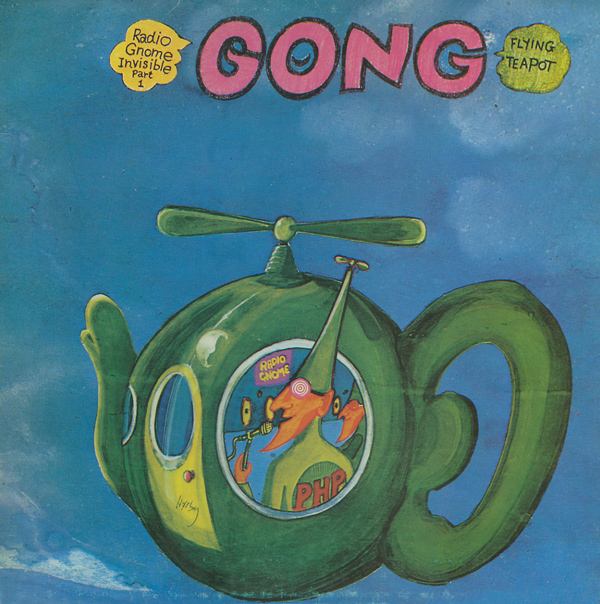
Although Gong had reached a new height musically, personnel-wise they were in a state of chaos. Pip Pyle and Christian Tritsch both left the band, and Allen, Smyth, and Malherbe picked up the pieces and reformed Gong into what was to be known as their "classic" lineup. Steve Hillage joined on guitar (having left Kevin Ayers's band), Tim Blake took the synthesizer seat, Francis Moze (from Magma) took up the bass, and Venus Deluxe was recruited as their live sound engineer. A variety of drummers came and left during this period, and Gong finally settled on ol' faithful Rachid Houari as a temporary replacement for their next album, Flying Teapot (released in May, 1973, as the second album on the new Virgin label).
This album was the first installment in the "Radio Gnome" trilogy, a whimsically loose story about Zero the Hero and his encounters with the Pot Head Pixies, who travel around in a Flying Teapot and hail from the Planet Gong... you get the picture. Although the concept lends a taste of humor to the songs, it's the music that really tells the story. More instrumentally-based than before, this new version of Gong was a prime example of so-called "space rock." Both the title track and "Zero the Hero and the Witch's Spell" broke into long, flowing jams (a couple of excellent live tapes from this period have been released on CD, and are well worth checking out). All the hard work must have worn Daevid and Gilli out, however, and they took a vacation from the band shortly after this album.
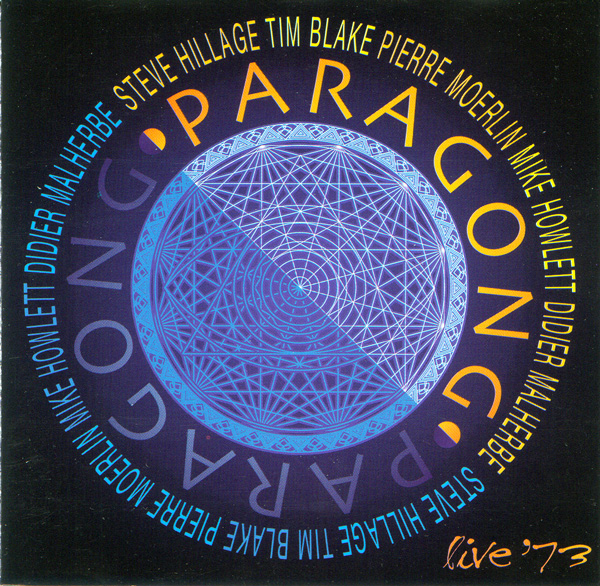
During Daevid and Gilli's absence, Gong expanded even more musically with the replacement of Houari with classically trained percussionist Pierre Moerlen (see interview in this issue), fresh from his training at the Strasbourg Conservatory. Along with new bassist Mike Howlett, the new band toured without Daevid and Gilli as Paragong, playing a variety of Kevin Ayers songs, R&B, and instrumentals. Upon Daevid and Gilli's return, Gong recorded the second installment in the Radio Gnome Trilogy, entitled Angel's Egg. This diverse album featured writing by all the members of the band: Allen reprised "Selene" from the Camembert Electrique album, collaborated with Malherbe on the slithery ditty "Oily Way," and collaborated with Blake on the atmospheric album opener "Other Side of the Sky." Hillage weighed in with the brief "Castle in the Clouds" and the unforgettable "I Never Glid Before." Moerlen contributed the mallet-driven "Love Is How Y Make It" (joined by fellow Strasbourg associate Mirielle Bauer). Howlett collaborated with Allen for the catchy "Sold to the Highest Buddha," and Malherbe closed the proceedings with the zany "Eat that Phone Book."
By this time, each of the band members had adopted the nicknames by which they were identified on the album sleeve: Daevid Allen became "Dingo Virgin"; Gilli Smyth became "Shakti Yoni"; Didier Malherbe of course became "Bloomdido Bad de Grasse"; Steve Hillage became "Submarine Captain"; Tim Blake became "Hi T Moonweed"; Mike Howlett became "Mista T Being"; and Pierre Moerlen became, simply, "Pierre de Strasbourg." As might be expected from such a whimsical outfit, each of these nicknames underwent numerous mutations and changes over time.
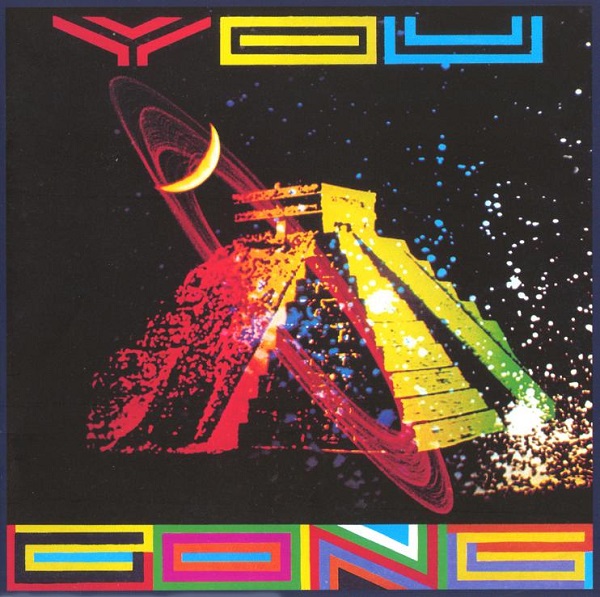 Although Daevid Allen's heart was not really in it, Gong then proceeded to make what is arguably their best album, and one of space rock fusion's true masterpieces, You (released 1974). This time, all the members collaborated in the writing, producing lengthy instrumentals led by Hillage's patented modal solos and Blake's spacey synths, grounded by Howlett's firm bass and Moerlen's nimble, busy drumming. "Master Builder" is a standout, and it later became a staple on Hillage's solo tours (credited on his live album as "The Glorious Om Riff"). "The Isle of Everywhere" featured Howlett and Moerlen's dexterity with tricky rhythms, ending with yet another Hillage solo. "A Sprinkling of Clouds" showcased Blake's inventive use of synthesizers to create a musical mantra. Allen revisits the past edgy Gong sound with the lengthy album closer, "You Never Blow Yr Trip Forever."
Although Daevid Allen's heart was not really in it, Gong then proceeded to make what is arguably their best album, and one of space rock fusion's true masterpieces, You (released 1974). This time, all the members collaborated in the writing, producing lengthy instrumentals led by Hillage's patented modal solos and Blake's spacey synths, grounded by Howlett's firm bass and Moerlen's nimble, busy drumming. "Master Builder" is a standout, and it later became a staple on Hillage's solo tours (credited on his live album as "The Glorious Om Riff"). "The Isle of Everywhere" featured Howlett and Moerlen's dexterity with tricky rhythms, ending with yet another Hillage solo. "A Sprinkling of Clouds" showcased Blake's inventive use of synthesizers to create a musical mantra. Allen revisits the past edgy Gong sound with the lengthy album closer, "You Never Blow Yr Trip Forever."
Having made one of the most intense albums of all time, Gong then split up. Thankfully, many live documents of this classic era of Gong have been released on CD. Virgin released Live, Etc. in 1977, a fine overview of the band's history, with numerous rare tracks and a couple of previously unreleased studio songs. All the classics are here: "You Can't Kill Me," "Zero the Hero and the Witch's Spell," "Flying Teapot," "Dynamite/I Am Your Animal"... and that's only the first four tracks! A studio track, "Where Have all the Flowers Gone," opens with some incredible blues harmonica (by Tim Blake). This CD is relatively cheap and easy to find, so I recommend it highly for the uninitiated.
Two unedited concert performances from this era have been released on Mantra, Bataclan 1973 and Sheffield 1974. Both have fine sound quality and lots of spacey improvisation.
Pierre Moerlen's Gong
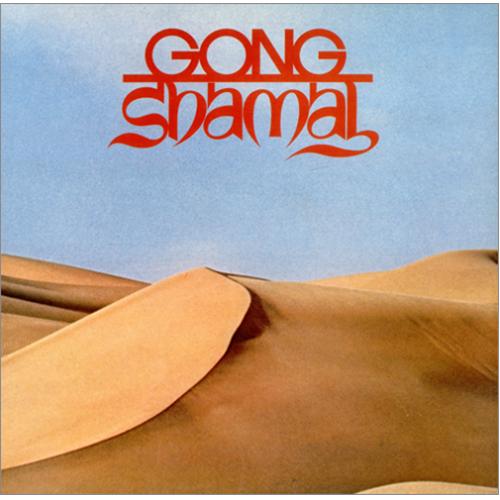 Undaunted by Allen, Hillage, and Blake's departure, Pierre Moerlen assumed leadership of the group, and recruited his friends Mirielle Bauer (marimba, assorted percussion) and Patrice Lemoine (keyboards) for the next album, Shamal (released 1975). Except for Howlett's moody "Wingful of Eyes," and some brief vocals on the title cut, this album is entirely instrumental, taking advantage of Moerlen's percussion skills and Malherbe's woodwinds. With no guitars present, the majority of the tonal color is provided by Moerlen and Bauer's malleted percussion, with Lemoine's keys filling the gaps. Moerlen's "Mandrake" is a standout, as is Malherbe's bamboo flute composition "Bambooji."
Undaunted by Allen, Hillage, and Blake's departure, Pierre Moerlen assumed leadership of the group, and recruited his friends Mirielle Bauer (marimba, assorted percussion) and Patrice Lemoine (keyboards) for the next album, Shamal (released 1975). Except for Howlett's moody "Wingful of Eyes," and some brief vocals on the title cut, this album is entirely instrumental, taking advantage of Moerlen's percussion skills and Malherbe's woodwinds. With no guitars present, the majority of the tonal color is provided by Moerlen and Bauer's malleted percussion, with Lemoine's keys filling the gaps. Moerlen's "Mandrake" is a standout, as is Malherbe's bamboo flute composition "Bambooji."
In an aggressively rock-fusion turn, Gong then released the high-energy Gazeuse!, with then relatively unknown guitarist Allan Holdsworth. Many of Moerlen's best compositions are on this album, including the all-percussion "Percolations (Part 1 & 2)," which begins with quietly ringing vibes, segues into a furious marimba/vibe duet, and ends with a memorable drum solo. Holdsworth is no slouch, either, and he contributes the Jeff Beck-like "Night Illusion" and "Shadows Of." For its full instrumental palate, this remains one of Gong's best albums.
Moerlen and company continued in this vein, minus Holdsworth, on the followup Expresso II (the American release of Gazeuse had been named Expresso). Pierre's brother Benoit Moerlen (also a percussionist) became a full-time member, and new bassist/guitarist Hansford Rowe proved invaluable as a second composer. While some of the intensity of Gazeuse is missing, some welcome new elements are apparent, such as the melodic fusion approach of Rowe's "Golden Dilemma." Mirielle Bauer also composes for the first time on a Gong album, with the flowing "Sleepy." New guitar recruit Bon Lozaga fills Holdsworth's shoes, with satisfying results.
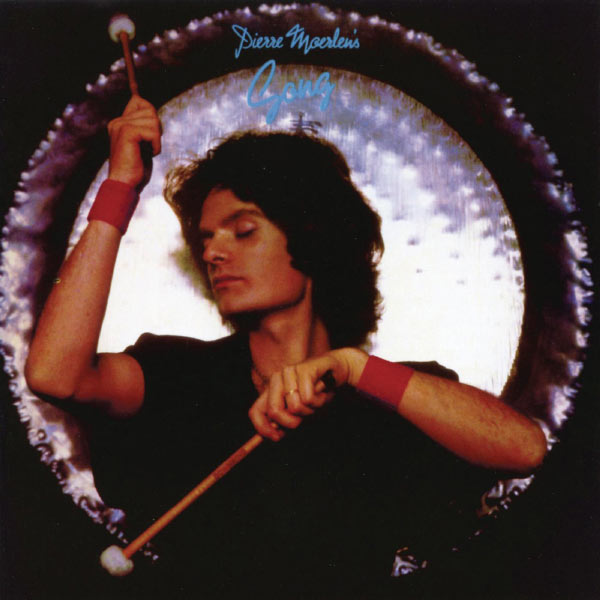
In 1979, Pierre Moerlen's Gong released two albums on the Arista label. The first is Downwind, which continues Moerlen's interest in mallet percussion arrangements, but adds a host of guest musicians, including Mike Oldfield, Steve Winwood, and Didier Malherbe on the impressive title cut. The band at this point is a core trio of Pierre Moerlen, Benoit Moerlen, and Hansford Rowe, with Ross Record (guitar) and Didier Lockwood (violin) making significant contributions. In an unexpected turn towards the mainstream, "What You Know" (with Mick Taylor on lead guitar) is actually quite catchy.
The next album, Time Is the Key, marks a partial return to complex, mallet-driven arrangements. The album's opening track, "Ard Na Greine," works well as a companion piece to Gazeuse's "Percolations," featuring Pierre on almost all the instruments. In fact, the whole first side holds together very well, with each track segueing into the next, like an extended suite. The music is characterized by repetetive, overlapping mallet rhythms in difficult time signatures, with fewer and less obvious guest appearances than were on the previous album. Moerlen's use of the synthesizer also pervades the album.
This edition of Gong's concert appearances was captured on Live, released in 1980. This album features live versions of songs from Shamal, Gazeuese, Expresso II, and Downwind. The relaxed assurance of the band makes for an impressive, loose-sounding outing that holds a good deal of energy.
Gong's influence continues to infiltrate the prog scene. Daevid Allen occasionally tours with Gilli Smyth and members of Here and Now, a fine Gong-influenced band, to successfully recreate the finest songs of Gong's heyday. Steve Hillage continued the You-period sound with his debut solo outing, Fish Rising (1976), which featured most of Gong's lineup, and which has rightfully earned a place in the prog hall of fame. Both Blake and Smyth have released several solo albums, and Mike Howlett has earned a reputation as a top notch producer. I will always remember Gong as not so much a band but a force, a force that precipitated and expanded much of the music I love, be it psychedelic rock, space rock, fusion, or even punk. Look over Gong's discography — I'm sure there's something there for everyone.
Filed under: Profiles, Issue 10
Related artist(s): Soft Machine, Steve Hillage / System 7, Gong, Daevid Allen, Here and Now, Pip Pyle, Pierre Moerlen
What's new
These are the most recent changes made to artists, releases, and articles.
- Release: Thierry Zaboitzeff - Artefacts
Updated 2026-02-27 00:16:46 - Review: Kevin Kastning - Codex I & Codex II
Published 2026-02-27 - Release: Zan Zone - The Rock Is Still Rollin'
Updated 2026-02-26 23:26:09 - Release: The Leemoo Gang - A Family Business
Updated 2026-02-26 23:07:29 - Release: Ciolkowska - Bomba Nastoyashchego
Updated 2026-02-26 13:08:55 - Review: Immensity Crumb - Chamber Music for Sleeping Giants
Published 2026-02-26 - Release: The Gatekeepers - Diary of a Teenage Prophet
Updated 2026-02-25 15:55:58 - Review: Mars Lasar - Grand Canyon
Published 2026-02-25 - Listen and discover: Mordecai Smyth will not break your back
Published 2026-02-25 - Release: Tashi Wada - What Is Not Strange?
Updated 2026-02-24 14:56:16 - Artist: Tashi Wada
Updated 2026-02-24 14:54:34 - Release: Greg Segal - Maintain!
Updated 2026-02-24 00:38:03 - Review: Il Segno del Comando - Sublimazione - Live
Published 2026-02-24 - Review: Nektar - Mission to Mars & Fortyfied
Published 2026-02-23 - Review: Jaime Rosas - Tres Piezas de Rock Progresivo
Published 2026-02-22 - Release: Kevin Kastning & Bruno Råberg - Across Tall Rain
Updated 2026-02-21 00:42:08 - Review: Gary Husband - Postcards from the Past
Published 2026-02-21 - Release: Daniel Crommie - Februa
Updated 2026-02-20 14:23:17
